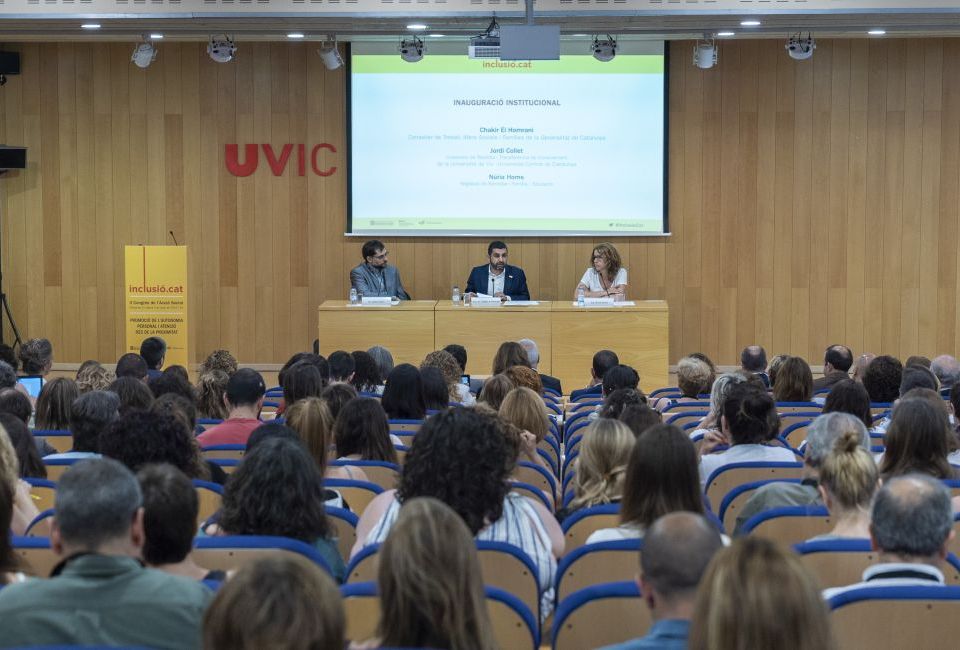
Greater stress on the community and decentralised and accessible social services - a factor in enhancing individual autonomy
The second Congress on Social Action in Catalonia, Inclusió.cat, which was attended by 330 professionals from the sector over two days who considered the present and future of the Social Services in Catalonia, ended at the UVic this afternoon. Lectures, round table discussions and various parallel sessions highlighted the fundamental role of the community and decentralised and accessible social services in enhancing the autonomy of the system’s users. Inclusió.cat was organised by the Chair in Social Services of the University of Vic - Central University of Catalonia (UVic-UCC) and the Ministry of Labour, Social Affairs and Family of the Government of Catalonia, and this year considered the challenge involved in fostering personal autonomy and care at home.
This was the subject of one of the main round tables at the congress on Thursday morning, which presented two European models to promote personal autonomy: the Dutch model, presented by Marcel van Druenen, the head of programmes at Divosa, the country's social security office, and the Danish model, presented by Gráinne C. Stevenson, a specialist consultant at the National Social Services Board. "Although their demographic situation is different and their systems are more mature than ours, their experiences show that decentralised municipal models and an increased importance for community social services are the way forward," said Marina Geli, president of the scientific committee and strategic coordinator of the Centre for Health and Social Care Research (CESS).
The Congress discussed the need to develop new organisational models focusing on people, prioritising support at home and the community on an integrated basis, how institutions and service providers must adapt to this new situation, and how government bodies must become partners in this restructuring process. The sessions also involved discussions on how innovation in social services should be applied and can help in this area, and how to reinforce models based on proximity. According to Marina Geli, associations of municipalities and regional councils "enable work to be done towards personal autonomy based on proximity and the community, but without the need to dismantle municipal councils," while neighbourhood and informal networks must also regain their former importance.
Chakir el Homrani opens the Congress
Chakir el Homrani, the Minister of Labour, Social Affairs and Family, opened the congress yesterday morning. In his speech, he stressed the importance of forums for reflection like this one, and highlighted the role of scientific knowledge "as a decisive factor in decision-making" in the social services field, because "there can be no social science without a critical and in-depth perspective, without reflection and debate, without considering the how inequalities are reproduced." For El Homrani, the objective of the modern Catalan Social Services system is ambitious and involves "increasing the coverage of social services with a preventive rather than a palliative approach, and providing accessible care that enables personal autonomy, rather than an institutionalised or chronic care response." The Minister summed up the idea in a phrase: "providing more people with earlier and better care, preventively and in their homes" The Minister announced that the Ministry is completing a document which lays the foundations for the future Strategic Plan for Social Services.
The vice-rector for Research and Knowledge Transfer of the UVic-UCC, Jordi Collet, also participated in the opening discussion, and welcomed those attending and recalled that "the social and health fields are a fundamental and foundational area for our university." The Councillor for Welfare and Family of Vic Municipal Council, Núria Homs, stressed her commitment to social services that "are able to combine the organisational needs of institutions and personal needs, with an individual perspective that takes individuals' values and preferences into account," and said that this is the path followed by Vic and the Osona region.
The speakers at the closing session of the congress, which took place at midday on Thursday, were Josep-Eladi Baños, the rector of the UVic-UCC, and Francesc Iglesies, Secretary of Social Affairs and Families of the Government of Catalonia.
Analysis of experiences and good practices
110 communications and posters were presented during the congress, analysing experiences and proven good practices, studies, research and projects evaluated based on four areas of content: prevention and care in the home and community environment; the organisational models and service platforms of the various institutions and agencies working in the Catalan social services system; primary and social healthcare, which must move towards integrated care, and technological solutions (digital, architectural, products, machinery, etc.) which could be useful in promoting people's autonomy.
Inclusió.cat, which takes place every two years, is a benchmark and a forum for all those involved in the Catalan Social Services System, as well as a space for creating and disseminating knowledge. More than 300 people participated in this event, including social services professionals, third sector organisations, policymakers, researchers, academics and experts in this field, as well as bachelor's degree, postgraduate and doctoral students in disciplines related to the social services.